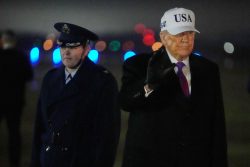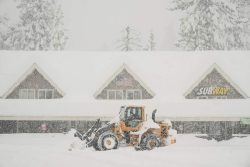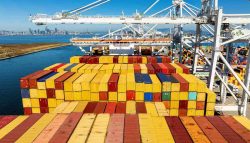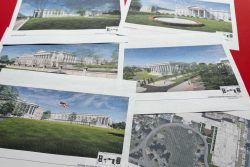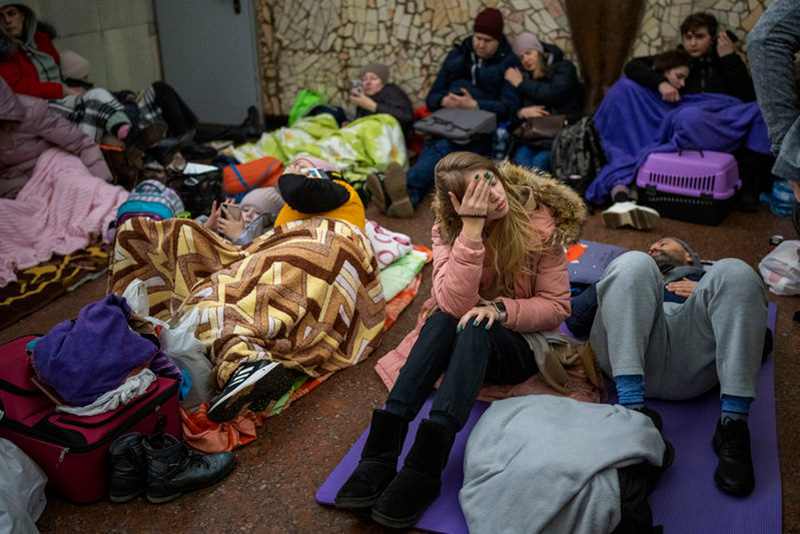
People rest in the Kyiv subway, using it as a bomb shelter in Kyiv, Ukraine, on Thursday.
8:13 JST, February 25, 2022
KYIV, Ukraine (AP) — Ukrainian President Volodymyr Zelenskyy has ordered a full military mobilization to counter the Russian invasion.
In a decree issued Thursday, he said the the mobilization would last 90 days.
He tasked the military’s general staff with determining the number of people eligible for service and the number of reservists as well as the order of the call-up. The president’s cabinet has been tasked with allocating money for the mobilization.
AP’s earlier story follows below.
KYIV, Ukraine (AP) — Russia launched a full-scale invasion of Ukraine on Thursday, unleashing airstrikes on cities and military bases and sending in troops and tanks from three sides in an attack that could rewrite the global post-Cold War security order. Ukraine’s government pleaded for help as civilians piled into trains and cars to flee.
Russian President Vladimir Putin ignored global condemnation and cascading new sanctions as he unleashed the largest ground war in Europe since World War II, and chillingly referred to his country’s nuclear arsenal. He threatened any country trying to interfere with “consequences you have never seen.”
Ukrainian officials said their forces were battling Russians on multiple fronts, had suffered dozens of deaths and had lost control of the decommissioned Chernobyl nuclear power plant, scene of the world’s worst nuclear disaster.
“Russia has embarked on a path of evil, but Ukraine is defending itself and won’t give up its freedom,” Ukrainian President Volodymyr Zelenskyy tweeted.
U.S. President Joe Biden announced new sanctions against Russia, saying Putin “chose this war” and that his country would bear the consequences of his action. Other nations also announced sanctions, or said they would shortly.
Fearing a Russian attack on the capital city, thousands of people went deep underground as night fell, jamming Kyiv’s subway stations.
At times it felt almost cheerful. Families ate dinner. Children played. Adults chatted. People brought sleeping bags or dogs or crossword puzzles — anything to alleviate the waiting and the long night ahead.
But the exhaustion was clear on many faces. And the worries.
“Nobody believed that this war would start, and that they would take Kyiv directly” said Anton Mironov, waiting out the night in one of the old Soviet metro stations. “I feel mostly fatigue. None of it feels real.”
The invasion began early Thursday with a series of missile strikes, many on key government and military installations, quickly followed by a three-pronged ground assault. Ukrainian and U.S. officials said Russian forces were attacking from the east toward Kharkiv, Ukraine’s second-largest city; from the southern region of Crimea, which Russia annexed in 2014; and from Belarus to the north.
Zelenskyy, who had earlier cut diplomatic ties with Moscow and declared martial law, appealed to global leaders, saying that “if you don’t help us now, if you fail to offer a powerful assistance to Ukraine, tomorrow the war will knock on your door.”
Both sides claimed to have destroyed some of the other’s aircraft and military hardware, though little of that could be confirmed.
Hours after the invasion began, Russian forces seized control of the now-unused Chernobyl plant and its surrounding exclusion zone after a fierce battle, presidential adviser Myhailo Podolyak told The Associated Press.
The Vienna-based International Atomic Energy Agency said it was told by Ukraine of the takeover, adding that there had been “no casualties or destruction at the industrial site.”
The 1986 disaster occurred when a nuclear reactor at the plant 130 kilometers (80 miles) north of Kyiv exploded, sending a radioactive cloud across Europe. The damaged reactor was later covered by a protective shell to prevent leaks.
The chief of the NATO alliance, Jens Stoltenberg, said the “brutal act of war” shattered peace in Europe, joining a chorus of world leaders decrying an attack that could cause massive casualties and topple Ukraine’s democratically elected government. The conflict shook global financial markets: Stocks plunged and oil prices soared amid concerns that heating bills and food prices would skyrocket.
Condemnation came not only from the U.S. and Europe, but from South Korea, Australia and beyond — and many governments readied new sanctions. Even friendly leaders like Hungary’s Viktor Orban sought to distance themselves from Putin.
British Prime Minister Boris Johnson said he aimed to cut off Russia from the U.K.’s financial markets as he announced sanctions, freezing the assets of all large Russian banks and planning to bar Russian companies and the Kremlin from raising money on British markets.
“Now we see him for what he is — a bloodstained aggressor who believes in imperial conquest,” Johnson said of Putin.
The U.S. sanctions will target Russian banks, oligarchs, state-controlled companies and high-tech sectors, Biden said, but they were designed not to disrupt global energy markets. Russian oil and natural gas exports are vital energy sources for Europe.
Zelenskyy urged the U.S. and West to go further and cut the Russians from the SWIFT system, a key financial network that connects thousands of banks around the world. The White House has been reluctant to immediately cut Russia from SWIFT, worried it could cause enormous economic problems in Europe and elsewhere in the West.
While some nervous Europeans speculated about a possible new world war, the U.S. and its NATO partners have shown no indication they would send troops into Ukraine, fearing a larger conflict. They instead mobilized troops and equipment around the alliance’s flanks as Ukraine pleaded for defense assistance and help protecting its airspace.
NATO reinforced its members in Eastern Europe as a precaution, and Biden said the U.S. was deploying additional forces to Germany to bolster NATO.
European authorities declared the country’s airspace an active conflict zone.
After weeks of denying plans to invade, Putin launched the operation on a country the size of Texas that has increasingly tilted toward the democratic West and away from Moscow’s sway. The autocratic leader made clear earlier this week that he sees no reason for Ukraine to exist, raising fears of possible broader conflict in the vast space that the Soviet Union once ruled. Putin denied plans to occupy Ukraine, but his ultimate goals remain hazy.
Ukrainians were urged to shelter in place and not to panic.
“Until the very last moment, I didn’t believe it would happen. I just pushed away these thoughts,” said a terrified Anna Dovnya in Kyiv, watching soldiers and police remove shrapnel from an exploded shell. “We have lost all faith.”
With social media amplifying a torrent of military claims and counter-claims, it was difficult to determine exactly what was happening on the ground.
Russia and Ukraine made competing claims about damage they had inflicted. Russia’s Defense Ministry said it had destroyed scores of Ukrainian air bases, military facilities and drones. It confirmed the loss of one of its Su-25 attack jets, blaming “pilot error,” and said an An-26 transport plane had crashed because of technical failure, killing the entire crew. It did not say how many were aboard.
Russia said it was not targeting cities, but journalists saw destruction in many civilian areas.
Ukraine’s health minister said 57 Ukrainians were killed in the invasion and 169 more were wounded. It was not clear how many were civilians, although earlier in the day it had said 40 soldiers had died.
Poland’s military increased its readiness level, and Lithuania and Moldova moved toward doing the same.
Putin justified his actions in an overnight televised address, asserting the attack was needed to protect civilians in eastern Ukraine — a false claim the U.S. predicted he would make as a pretext for invasion. He accused the U.S. and its allies of ignoring Russia’s demands to prevent Ukraine from joining NATO and for security guarantees, saying the military action was a “forced measure.”
Anticipating international condemnation and countermeasures, Putin issued a stark warning to other countries not to meddle.
In a reminder of Russia’s nuclear power, he warned that “no one should have any doubts that a direct attack on our country will lead to the destruction and horrible consequences for any potential aggressor.”
Inside Russia, authorities moved swiftly to crack down on any critical voices. OVD-Info, a group that tracks political arrests, reported 1,620 people in 52 Russian cities had been detained for protesting the invasion, more than half of them in Moscow.
Top Articles in News Services
-

Survey Shows False Election Info Perceived as True
-

Prudential Life Expected to Face Inspection over Fraud
-

Hong Kong Ex-Publisher Jimmy Lai’s Sentence Raises International Outcry as China Defends It
-

Japan’s Nikkei Stock Average Touches 58,000 as Yen, Jgbs Rally on Election Fallout (UPDATE 1)
-

Trump Names Former Federal Reserve Governor Warsh as the Next Fed Chair, Replacing Powell
JN ACCESS RANKING
-

Japan PM Takaichi’s Cabinet Resigns en Masse
-

Japan Institute to Use Domestic Commercial Optical Lattice Clock to Set Japan Standard Time
-

Israeli Ambassador to Japan Speaks about Japan’s Role in the Reconstruction of Gaza
-

Man Infected with Measles Reportedly Dined at Restaurant in Tokyo Station
-

Videos Plagiarized, Reposted with False Subtitles Claiming ‘Ryukyu Belongs to China’; Anti-China False Information Also Posted in Japan


